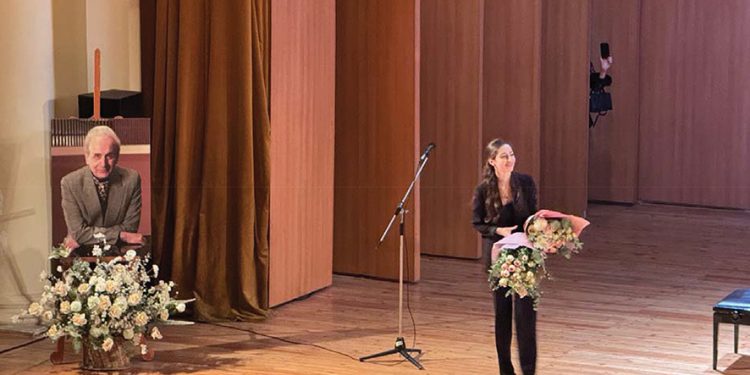Irma Gigani, the featured pianist at the opening of the XII International Music Festival in memory of Tengiz Amirijibi, on October 19, presented a refined exploration into the piano repertoire. She merged late-Beethovenian reflection with Scriabin’s dramatic energy and Chopin’s lyrical finesse. The carefully chosen program of Irma Gigani took the listener through a journey of complex emotional landscapes. From the philosophical depths in Beethoven’s Sonata No. 31 to the lyrical yet stormy forms of Scriabin, and Chopin.
Tengiz Amirejibi International Music Festival is one of Georgia’s most prestigious music gatherings. It celebrates the rich cultural heritage of the country while embracing the world of classical. The festival was founded to honor the legacy Georgian pianist and teacher Tengiz Amirejibi. It has since become a platform for both emerging and established classical music talents. Amirejibi was a celebrated figure in Georgian music, and was praised for his interpretations of Romantic pieces, as well as his contributions to the development in Georgia of piano education. His influence was felt far beyond his native country, and the festival, now in it’s 12th year continues to embody this spirit of artistic excellence. It brings together world-class musicians and music lovers.
Irma Gianni’s Pianistic voice: Crafting narrative through structure and emotion
Irma Gigani, a pianist and interpreter known for her dynamic style and technical mastery presented a program that pushed the listener to their emotional and intellectual limits. The concert’s progression–from Beethoven late works to Chopin mature voice-demonstrates Gigani’s mastery of the classical tradition, while also offering a journey through the Romantic expansion in musical language. Each piece was a culmination of the composer’s sonata form achievements, unfolding an unique narrative driven both by structural innovation and deep emotion.
The Inner Journey of Beethoven’s Sonata No. 31
Beethoven’s Sonata No. 31, Op. 110 is one of the most contemplative and final works of the composer, marking the end of his lifelong relationship with piano sonatas. Gigani’s sonata interpretation emphasized the work’s spiritual and introspective quality. The first movement Moderato cantabile, molto expressivo, is often regarded as a dialogue between inner reflection and a conversational lyricism. It served as an invitation for the audience to step into Beethoven’s world. The evening’s tone was set by Gigani, who was able to navigate this inner dialog, allowing the melodic lines space to breathe. Her approach favored subtle dynamics that highlighted Beethoven’s late period style, rich in harmonic exploration and thematic developments.
Gigani’s Allegro molto juxtaposed the playful with the forceful. He created sharp contrasts which kept the audience on their toes. It was the final Adagio, non troppo-Fuga that Gigani’s interpretive skills really shone. The fugue is one of Beethoven’s most intellectually challenging movements. It was a challenge for the performer, both technically and emotionally. Gigani balanced the mathematical rigor and sacred quality of the fugue, drawing connections between formal and spiritual. This was a challenge that she fully accepted.
Sonata No. 1 by Scriabin 1: Tragedy and Triumph In Sound
Gigani’s interpretation, based on Beethoven’s Sonata No. 1 in F minor Op. The 6 marked the beginning of a new era filled with intensity and conflict. This early Scriabin work reflected his struggle to overcome personal tragedy. Gigani’s performance highlighted the raw emotional outpouring that is embedded in this piece, especially in its first movement, Allegro with fuoco. Gigani’s performance of this piece, which is characterized by rapid scales and dissonant notes, embodied the raw, emotional outpouring embedded in the music.
The second movement, Adagio offered a moment of rest, and Gigani demonstrated her ability to sustain long lyrical phrases with a deep singing tone. She then jumped into the stormy Presto, and the tragic finale, Funebre. Scriabin’s sonata was Romantic but classical in its structure, with harmonic tensions that reflect existential struggle. Gigani’s interpretation captures this duality. She uses her technical prowess while maintaining the emotional weight in the work.
Chopin’s Mazurkas – Lyrical Reflections on a National Spirit
After the intermission the mood changed as Gigani played Chopin’s Mazurkas Op. 30 No. 1, Op. 30 No. There are 17 No. 17 No. 4. These miniatures are intimate reflections of Chopin’s Polish heritage and are filled with folk rhythms and harmony. Gigani, who has a deep understanding of lyrical expressiveness, approached these pieces delicately, bringing out the dance-like quality while infusing the subtle melancholy that permeates Chopin’s compositions. The Mazurka in A Minor, Op. 17 No. The fourth piece, “4”, offered emotional depth within a few minutes. Gigani’s sensitive use of phrasing, tempo, and rhythm conveyed the wistful and almost nostalgic mood.
Chopin’s Sonata No. 3 in B minor, Op. 58: Virtuosity & Poeticism
Chopin’s Sonata No. Gigani closed the program with Chopin’s Sonata No. 58, Gigani was faced with one of the most technically challenging works in the piano repertory. Allegro maestoso was a first movement that combined virtuosic runs and sweeping, lyrical melody, giving Gigani the opportunity to show both technical brilliance as well as emotional depth. She balanced the bravura sections with moments of calm introspection, capturing the duality inherent in Chopin’s music.
The second movement Scherzo Molto vivace provided a playful contrast to Gigani’s stormy first movement. Here, Gigani’s quick reflexes and light touch were on full display. Gigani’s interpretive depth was most evident in the Largo – the emotional core of the sonata.
Finale: Presto Non Tanto, the sonata’s final movement, brought it to a virtuosic end. The technical mastery of Gigani was on full display. This brought the concert to an exciting and satisfying conclusion, leaving a lasting impression on the audience.
Thematic and emotional cohesion
Irma Gigani’s performance at the XII International Music Festival in honor of Tengiz Amirejibi demonstrated her profound knowledge of the piano’s expressive capabilities. Gigani’s program, which included Beethoven, Scriabin and Chopin, not only demonstrated her technical and interpretative skills, but also took the audience through some of piano repertoire’s most profound emotional and philosophy landscapes. This unforgettable evening paid homage to Tengiz’s legacy while setting the scene for the festival’s subsequent concerts.
By Ivan Nechaev
Read More @ georgiatoday.ge




